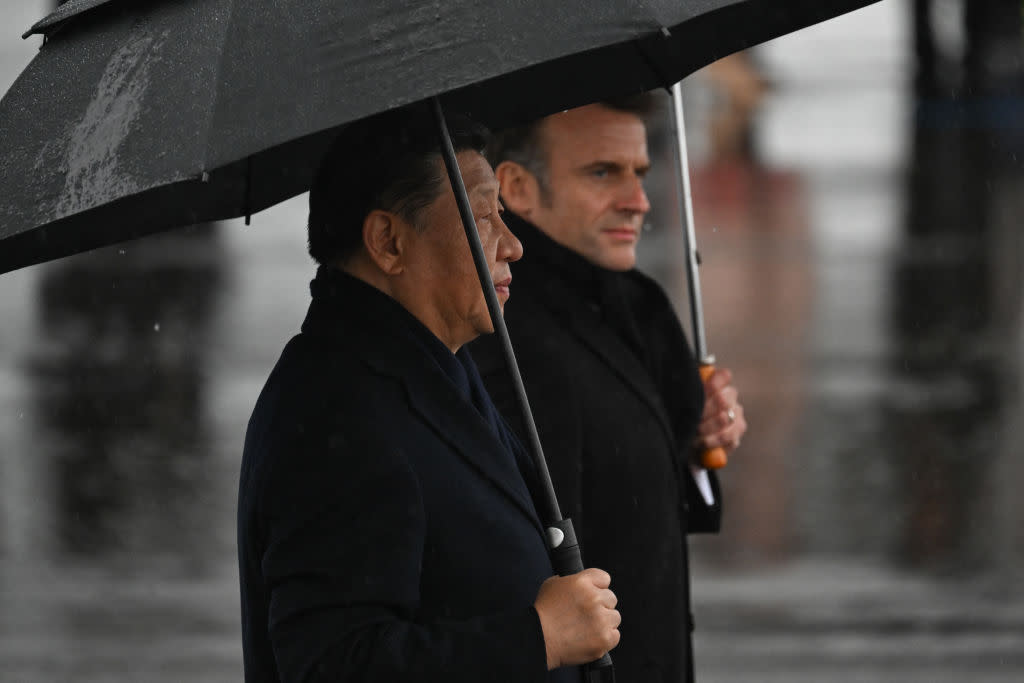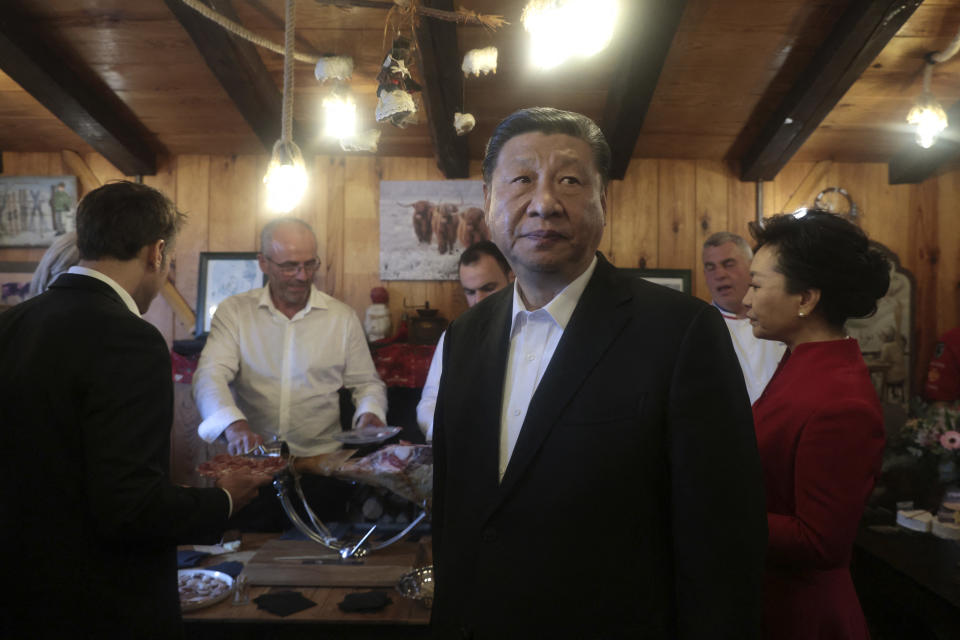Xi Underscores Bilateral Benefits Over Collective Blues

- Oops!Something went wrong.Please try again later.
- Oops!Something went wrong.Please try again later.
- Oops!Something went wrong.Please try again later.
Chinese President Xi Jinping and French President Emmanuel Macron at the Tarbes-Lourdes airport in southwestern France, May 7, 2024. <br> Credit - Ed Jones—AFP/Getty Images
It’s been a three-nation European tour with a two-part message. On Monday, Chinese President Xi Jinping arrived in Paris, where he met with French President Emmanuel Macron and European Commission President Ursula von der Leyen to argue the point that engagement with China is a net good.
Then, on Tuesday, came the postscript: Xi traveled to Serbia to mark the anniversary of the bombing of Belgrade’s Chinese Embassy in 1999 by five stray NATO rockets amid its occupation of Kosovo. The implication that meddling by NATO—and by extension, its chief sponsor, the U.S.—is detrimental to local interests was clear even before Xi spelt it out in a letter published by the Serbian newspaper Politika.
“Twenty-five years ago today, NATO flagrantly bombed the Chinese Embassy in Yugoslavia, killing three Chinese journalists,” Xi wrote. “This we should never forget. The Chinese people cherish peace, but we will never allow such tragic history to repeat itself.”
Of course, the preference of China’s top communist for the individual over the collective isn’t just reserved for NATO. Even before Xi touched down in Belgrade, the message in Paris was that China was willing to build ties with European nations even as the European Union becomes increasingly problematic. In 2019, the E.U. labeled China a “systemic rival” and has criticized Beijing over human-rights abuses, its support for Russia’s war in Ukraine, spreading disinformation, rampant espionage, economic retaliation against small nations like Lithuania, and unfair trade practices.
Little wonder Xi hasn’t time for that bloc either. On Wednesday, on his final stop, Xi touched down in Hungary, the most mutinous of E.U. members, whose avowedly “illiberal” Prime Minister Viktor Orbán is a vocal backer of both Xi and Russian President Vladimir Putin. “Hungary has played a very important role by vetoing E.U. sanctions on China on Xinjiang, Hong Kong, and Taiwan issues,” says Wang Yiwei, a professor of international affairs at Beijing’s Renmin University. “China appreciates Hungarian behavior and will invest in this close cooperation.”
Tellingly, Hungary received $11.5 billion in Chinese investment in 2023 alone. It is home to the largest foreign logistics and manufacturing base of China’s controversial telecoms firm Huawei and will soon also host the first European factory of Shenzhen-based EV giant BYD. Chinese investment in Serbia, meanwhile, has reached almost $20 billion over the past decade, according to government figures, with Beijing and Belgrade signing a free trade agreement last year. China is also building an—albeit stalled—high-speed railway connecting Belgrade and Bucharest as part of Xi’s signature Belt and Road Initiative. Xi’s wooing of arguably the region’s two most Europe-skeptic nations is a tried and tested playbook to champion bilateral ties over multi-party fora.
It’s not just nations on the fringes of the E.U. that are susceptible to inducement from the world’s second biggest economy. In Paris, von der Leyen pressed Xi on trade “imbalances,” calling Chinese state subsidies that lead to low-cost exports “a matter of great concern” that threaten European jobs. (Xi refused to admit that China had an overcapacity issue.) The E.U.’s 27 members ran a $314.72 billion goods trade deficit with China in 2023, according to Eurostat data, which, although down from the previous year, is still the second highest on record. “Europe will not waver from making tough decisions needed to protect its economy and security,” von der Leyen said.
That was perhaps wishful thinking. In September, Von der Leyen announced an investigation into subsidies assisting Chinese EV production, prompting Beijing to float tariffs against French brandy as possible retaliation. That’s naturally a bigger issue for Macron, who was only too happy to turn on the charm with Xi, delving into his own playbook of building personal rapport with even antagonistic world leaders. After pomp and pageantry at the Elysée Palace in Paris, the French President thanked Xi for “openness regarding the provisional measures on French Cognac and his wish not to see them applied,” before presenting him with a couple of prized bottles: a Hennessy X.O. and a Remy Martin Louis XIII.
Macron then whisked Xi and both their wives to southwestern France’s mountainous Pyrenees, where they were entertained in driving rain by a traditional shepherd’s dance, before settling down to a lunch of local ham, lamb, cheese, and blueberry pie. Macron presented Xi with a blanket made from Pyrenees wool, a Tour de France cycling jersey, and, tellingly, yet more brandy: an Armagnac.

Aurelien Morissard—Pool/ AFP/Getty Images
Macron is not the only European leader to waver from the E.U. line when confronted by national interests. When German Chancellor Olaf Scholz visited Beijing accompanied by a bevy of business leaders last month, he pressed Xi on Ukraine and unfair trade practices while avoiding combative language that might imperil some of the 5,000 German companies active in the Chinese market, a fact that makes Germany—whose economy shrunk last year—a prime loser of any Chinese sanctions against the E.U. “The European Union plays the bad cop and member states like France and Germany are the good cops who understand that China is still an opportunity,” says Wang.
Still, when the E.U.’s two biggest economies struggle to hold the line, it doesn’t exactly project solidarity to the bloc’s smaller members. And individual thinking in Europe is especially important for Xi as the continent has bonded with Washington over shared outrage regarding Russia’s war in Ukraine.
“Xi is trying to encourage a Europe that’s more independent from the United States, which fits into his vision of a multipolar world and provides more space for the [People’s Republic] to operate in,” says Chong Ja Ian, an expert on China’s diplomacy and professor at the National University of Singapore.
Moreover, the possible return of a Trump presidency and a rekindling of trans-Atlantic trade frictions makes it prudent for Xi to ramp up engagement now. At the very least, Xi’s red-carpet treatment in Europe will be grist for China’s domestic propaganda mill, presenting China’s leader as someone Western counterparts fawn over and beg to solve all their problems. “What did Macron or von der Leyen get out of it? Very little at this point,” says Nis Grünberg, lead analyst for politics and society at the Berlin-based Mercator Institute for China Studies. “The status quo is probably the best we can hope for.”
Write to Charlie Campbell at charlie.campbell@time.com.

